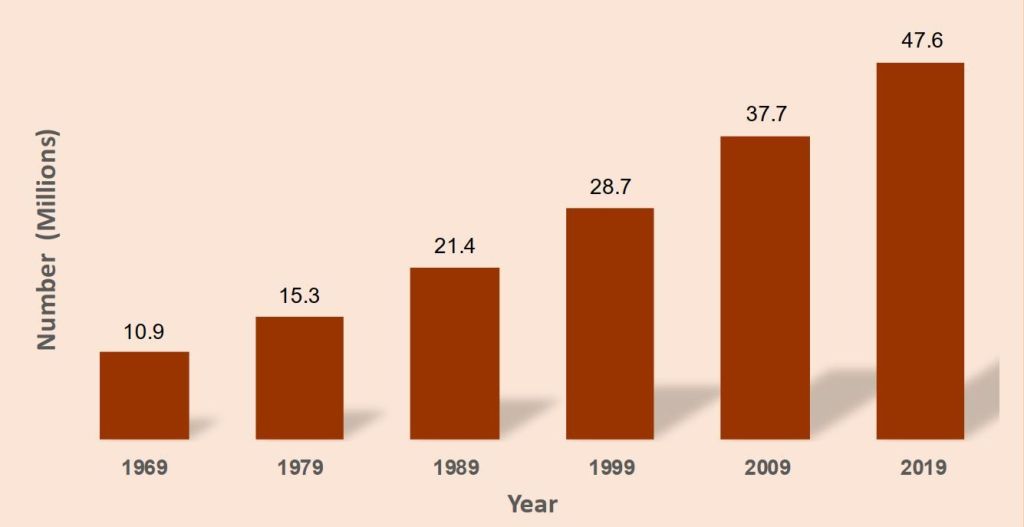On Friday 21st February, The Kenya National Bureau of Statistics released three more reports (Volume II, III and IV) of the 2019 Kenya Population and Housing Census (KPHC) of the 2019 census results indicating that Kenya’s population is 47.5 Million. The census reveals unflattering data about the quality of life of most Kenyans —the quality of housing, source of drinking water, source of cooking fuel. About 41 per cent of rural houses have walls built from mud and cow dung. This proportion ranges between 50 per cent and 80 per cent in most counties in Coast, the Rift Valley, Western and Nyanza. Similarly, mud, sand and cow dung were the dominant material used to construct floors for 43 per cent of main dwelling units. Only 10 per cent of Kenya’s households have access to piped water in their dwelling houses. About 14 per cent had access to piped water from a nearby standpipe. According to the figures, youth unemployment stood at 39 per cent, with 5.2 million people aged between 18 and 34 years out of work.
Comment:
The shocking figures, showing the deplorable condition of people, is an indication census figures that are yet to help government to eradicate the problems facing the public. The Neo-Malthusianism advocating that conducting census offers Governments an opportunity to plan effectively on service delivery is merely a fallacy under Capitalism. If population figures had a bearing on planning, people in arid and semi-arid areas of Kenya would not be living on harsh conditions lacking the basic social needs, dying from hunger on account of food shortages.
In political arena, the results have elicited mixed reactions from various quarters as the political impacts begin to take shape and with the raging the Building Bridges Initiative report debate and preparations for 2022 succession in top gear, the numbers have become a key focal point in shaping the political future. Since the release of the initial census results in November last year, a section of politicians in fear of losing their political powers dismissed the results that did show drastic shifts in population in some of the counties. National Assembly majority leader, Aden Duale, led a host of North Eastern leaders in demanding immediate release of the raw data relied upon by census officials. Sections of leaders from rift valley to Nyanza and the eastern part of the country have equally demanded explanation of dwindling numbers whose accuracy the Kenya National Bureau of Statistics defends as accurate.
Since Democracy is known to create divisions in its societies, then the more divided a country the more contentious a census tends to be. The fact that Kenya’s politics is conducted on ethnicity, censuses have been controversial ever. The numbers associated with particular ethnic groups are deemed to determine the outcomes of elections. Ethiopia, the second-most populous nation on the African Continent, has postponed its census twice since 2017 because of protests and ethnic violence. When it does finally happen, the outcome will be significant for groups vying for more regional powers – the larger the ethnic group, the stronger it will feel its claim for self-determination under Ethiopia’s ethnically-based federal system. The Sidama ethnic group in southern Ethiopia, for example, voted in past referendum to push for having its own state. Nigeria, too, has a long history of controversial censuses.
The last year’s national census is different from the previous counts as it indicated the act of state surveillance to its own citizens where people were required to provide their sensitive private information. This mass surveillance has been a key interest of the Government for almost a decade now. Under the banner of countering terror attacks, the State introduced the ‘Nyumba Kumi (ten houses) initiative which encourages locals to interact, share information about each other and provide information to the local administration and security organs. Historically, several governments have been using personal data to serve its dangerous agendas. American politician, Michele Bachmann, once observed, “If we look at American history, between 1942 and 1947, the data that was collected by the Census Bureau was handed over to the FBI and other organizations at the request of President Roosevelt, and that’s how the Japanese were rounded up and put into the internment camps”.
The entire idea of population census lies in erroneous theory ‘Population explosion’. In 1798, Rev Thomas Malthus published An Essay on the Principle of Population, stating that the “power of population is indefinitely greater than the power in the earth to produce subsistence for man”. This biased theory has motivated the population control policies promoted by the capitalist organizations such as Ford Foundation, the Rockefeller Foundation, and the Population Council.
Although Islam does not dispute the issue of census, it holds a strong view that every person born to this world comes with their provision (Rizq) allotted by Allah (swt), including their provision of food. Since the primary objective of Islamic model of economy is to have fair distribution of the wealth providing the necessities of every living soul, Al-Khilafah (Caliphate) is required to guarantee food, clothing and shelter to all its citizens. As a matter of fact, the Khilafah will not waste public funds by conducting census at the presence of the needy people as in the case capitalist governments. Furthermore the population growth is not real threat to economy; rather, it is the implementation of capitalist economic policies. Capitalism is founded on the basis of the exploitation of the masses, and the nurturing of the capitalist elites whose obsession of material power increases day by day.
Shabani Mwalimu
Media Representative of Hizb ut Tahrir in Kenya

